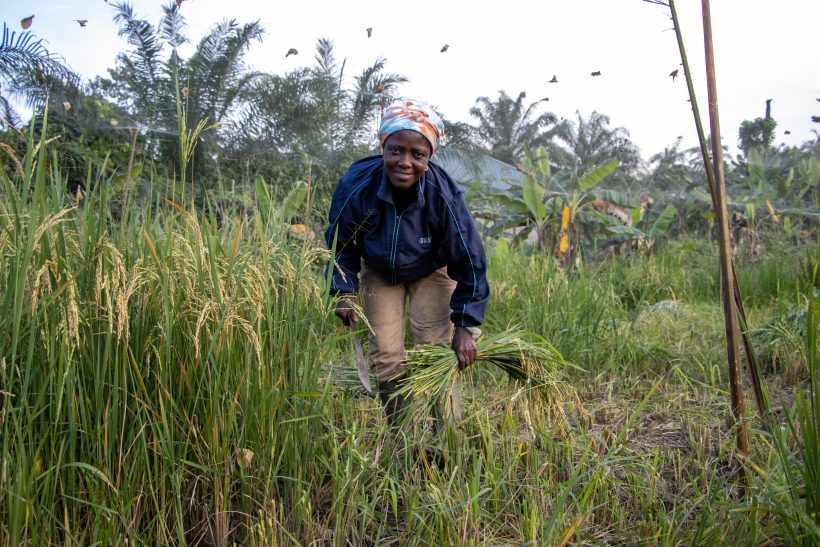
Rice farmer Mary Seruuaa harvesting rice at a farm in Enyires, Atiwa District, Ghana
African Women in Agricultural Research for Development (AWARD) has announced the Call for applications for a new career development Fellowship targeting women climate change professionals in Benin, Cameroon, Ghana, Kenya, Malawi, and Senegal.
Accelerating African Women’s Leadership in Climate Action aims to increase both the number of African women leading climate action and the development of climate solutions designed to address the needs of women and men smallholders.
More information on the applicant’s eligibility and application process is available here. The call for applications will close on September 10, 2024.
In our Top Ten Reads this month, we compile 10 resources that emphasize the need to pay attention to the gender gaps in climate action and the gendered impacts of climate change on agrifood systems.
The CGIAR Gender Impact Platform published an “Evidence Explainer”, which explores how climate mitigation efforts have the potential to increase women’s resilience and empowerment in agrifood systems, but more needs to be done to ensure their efficacy. Some of these critical interventions captured in the publication include the use of gender-responsive delivery models and training for integrating mitigation technology.
The Food and Agriculture Organization of the United Nations (FAO)’s recently published report highlights important data and evidence of impacts of climate change from 24 low and middle-income countries across five regions. This report also highlights the gap in bilateral financing and the cost of insufficient documentation of the plight of women in national climate policies and, what tools FAO is employing to address these inequalities.
This new report by the International Finance Corporation (IFC) explores how the private sector develops effective gender-inclusive climate governance. The report presents how companies in emerging markets take integrated action on climate and gender, and whether the presence of women in the senior leadership of these companies serves as a positive influence to drive gender-responsive climate governance.
How can stakeholders ensure their climate adaptation programs among smallholders are more gender-sensitive? This study by the International Livestock Research Institute (ILRI), assesses the implications of limited climate information and knowledge in farm women in Senegal, and lessons that can be learned to build their adaptive capacity.
This blogpost by UNICEF explores the link between agrifood and social protection systems in the face of a changing climate and outlines five things that actors need to prioritize. As climate change continues to widen the existing gaps and barriers women face in agrifood systems, the article outlines five ways policymakers, multilateral donors and international organizations can ensure adaptation measures that respond to the needs of women and girls in agrifood systems.
This policy brief developed by ICARDA explores the importance of prioritizing women’s participation and leadership in climate change governance. It reviews existing policies, specifically, international commitments and national adaptation and development, and proposes entry points for women’s leadership in the policy process in agrifood systems.
Launched by the UN Women at COP 28, this paper details how to achieve feminist climate justice, focusing on among other things, the processes countries should follow to foster the leadership of women and girls in driving climate action.
This article by The Conversation compiles findings from five research projects in Ethiopia, Malawi, Rwanda, Senegal, and Zambia. The projects tackle food insecurity by addressing gender inequality and environmental degradation. The article also proposes interventions such as reintroducing climate-change-resilient ancient grains that can help communities achieve food security.
Despite being launched in 2016, this policy brief by the United Nations Development Programme (UNDP) offers a timeless call to action on how to plug the gender gap in climate action. A key intervention highlighted is building the adaptive capacity of women by investing in their asset base. These interventions include but are not limited to, land, access to credit, and education.
In this article, TechnoServe presents a five-point analysis of the gendered impact of climate change and what can be done to address it. This analysis points out issues such as the impact of water scarcity on women’s workload among other findings.
